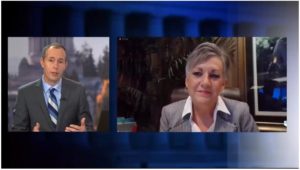
TVW’s Inside Olympia program invited me on for a lengthy interview this week, in my new position as Senate Republican budget leader. Click here to watch! (the link should go directly to the 35:00 mark, where my part begins)
Hello Friends and Neighbors,
Week three of our very unusual legislative session is over. I’ll start this report by thanking everyone who has already phoned, emailed, or written to me about issues or specific bills. As I figured, becoming the budget leader for our Senate Republican Caucus has placed many more demands on my calendar – but if you’d prefer a “virtual” face-to-face meeting instead of communicating by email or phone, contact my office and let’s try to find a time.
Minimal progress toward pandemic relief
After I sent last week’s report out, the Democratic caucus publicly released details about a package of pandemic-relief legislation. The contents weren’t a surprise. As the budget leader for our caucus I had been invited to offer input (thanks to Senator Christine Rolfes, chair of the Ways and Means Committee, who is my counterpart).
The surprise is that the Senate approved just one bill from the package during the course of this week. That legislation, SB 5061, is a complicated policy change involving unemployment-insurance (UI) benefits and how the state calculates the taxes it collects from employers to enable those benefits.
I voted to pass the bill because it may reduce UI taxes for some employers. However, it’s like making a smaller payment on a credit-card balance: the good news is that it can help people through a rough patch… the bad news is there’s an added cost at the other end. If SB 5061 becomes law, it could add $200 million to the tax burden on Washington employers. I’ve proposed a better way: tap the state’s rainy-day fund to “backfill” the UI fund. Unfortunately, the budget committee has yet to hold a hearing on my SB 5171.
Republicans press for vote on safe-reopening bill; governor loosens COVID restrictions
My report a week ago noted how turnout for the public hearing on SB 5114, the safe-reopening bill I’m co-sponsoring, was a record (1,500-plus) and overwhelmingly in support of the bill. When the Democratic chair of the State Government committee failed to put the bill on the agenda for a vote at Wednesday’s meeting, the lead Republican made a motion asking for a vote. The chair responded by abruptly adjourning the meeting without voting on any bills on the agenda! We decided to try going around that roadblock by asking for a vote on the bill by the full Senate. That motion also was blocked, on Wednesday evening.
All this bill would do is move our state – all eight regions designated by the governor – into Phase 2 of his restart plan. That would simply let restaurants and bars resume indoor service, to 25% capacity, which is where they were before the mid-November lockdown.
Our pressure to bring SB 5114 to a vote and help restaurants and other small employers survive must have caught someone’s attention. Yesterday, Governor Inslee changed the metrics again… so instead of requiring a region to meet four public-health standards, only three of the standards have to be met to move into Phase 2. I wish that was good news for the Clark County restaurant owners I’ve been meeting with for months – but unfortunately our Southwest region (Clark, Wahkiakum, Cowlitz, Skamania, Klickitat) is going to remain stuck in Phase 1 for at least two more weeks.
Clearly, we need to keep pressing for the passage of SB 5114, one way or the other. Only the West and Puget Sound regions meet the new looser standards and can move into phase 2 on Monday. You have to wonder… why are 47 of the 50 states open for business and we aren’t? What is happening in Washington that isn’t in the other 47? Things that make you go… hmmm.
Progress on bills to address ‘unanticipated’ revenue
There’s bipartisan interest in tightening the rules concerning who can do what with “unanticipated revenues.” This means money received by the state treasury (typically from the federal government) while the Legislature isn’t in session. Those dollars usually come with a designated purpose, so the governor allocates them accordingly.
This really hadn’t been an issue until billions in federal CARES Act dollars arrived after we adjourned in March 2020. The money arrived with very few strings attached, and because the governor wouldn’t call a special legislative session, he got to disburse all of it himself. Only 8% went to relief for businesses, even though businesses were the hardest-hit by the governor’s own decisions. I have to believe legislators would and could have done better.
I introduced SB 5316 to bring some new accountability to the handling of these unanticipated revenues; the chair of the Ways and Means committee has introduced SB 5162. They’re much alike, the biggest difference being how a new oversight committee would either approve or reject a request. Both bills had a public hearing this week. I’m confident we can figure out how to iron out the differences and come up with a strong bipartisan compromise to bring before our committee for a vote.
No progress on ‘emergency orders’ bill
At least our bipartisan safe-reopening bill (SB 5114) received a hearing before the State Government committee. My bill to make reasonable reforms regarding the review of the governor’s emergency proclamations continues to stall in the same committee.
I hate to think that the governor has reached over from the executive branch into our branch of government and convinced the chair to sideline my SB 5039, even though it has bipartisan sponsorship! Then again, he’s been very resistant to involving the entire legislative branch (other than leaders of the majority party) in decision-making about the pandemic since it began.
Update on access to democracy
National Guard troops have left the Capitol campus, but the tall chain-link fences are still there. That undoubtedly has a chilling effect on people who would otherwise gather at the seat of state government to show their support or opposition to legislation. I don’t care whether it’s the safe-reopen bill or the bill to ban the open carry of certain firearms at public demonstrations and the Capitol – there can be no question that closing the Capitol campus infringes on their ability to be heard.
The fences aren’t the only problem. During a meeting of the Ways and Means committee earlier this week, we had to wait several minutes when a Republican member was unable to vote because his internet connection was lost. Ironically, this is a colleague of mine who chose not to work from his home office east of the Cascades out of concern that his internet connection wouldn’t be completely reliable. He was in his Senate office on the Capitol campus, and still had trouble working virtually! That’s not good, and frankly, it’s one of the very concerns we’ve had all along.
Washington vaccinations should go in Washington arms
If you’ve followed news reports about the COVID-19 vaccine you know there are people who are “vaccine-reluctant” for any number of reasons. I respect the right of people to do what they feel is best for them when it comes to vaccines, so my frustration has nothing to with any of that: it’s about the state Department of Health failing to put priority on Washington residents.
I couldn’t believe it earlier this week when a DOH representative told a Portland TV station, in so many words, that Oregon residents were free to come north to the new mass-vaccination site at the Clark County Fairgrounds in Ridgefield. With Rep. Larry Hoff, from the neighboring 18th District in Clark County, I approached DOH and the governor’s office about it immediately. We were disappointed that the agency stuck to its position, as confirmed by this excerpt from an article published yesterday by The Daily News of Longview (emphasis added):
Vaccinations at the Ridgefield site are available by appointment only to eligible people who pre-registered, and the site will not accept walk-ins, according to the state Department of Health.
A steady stream of cars moved through the fairgrounds after it opened at 9 a.m. Tuesday, said Jim Beriault, site spokesman. Organizers are aiming to vaccinate about 730 to 750 people per day, he said.
Beriault said he saw mostly Washington license plates with just a couple from Oregon throughout the day. The sites are open to anyone eligible regardless of residence, according to the Department of Health.
Oregon has its own supply of vaccines. Every vaccine our state Department of Health puts into the arm of an Oregon resident is one less vaccine that can benefit a Washington resident. The governor has been complaining that our state hasn’t received enough vaccines for its own population. He needs to have a talk with his new secretary of health and explain that only Washington residents should be the beneficiaries of the vaccines sent to our state.
I’m sorry I can’t invite you to come and visit me at the Capitol, but if you have a question or concern, please contact me by email, letter or phone. To make an appointment for a virtual meeting, please sent me an e-mail! Stay safe!
Yours in service,
#freedomiseverything











